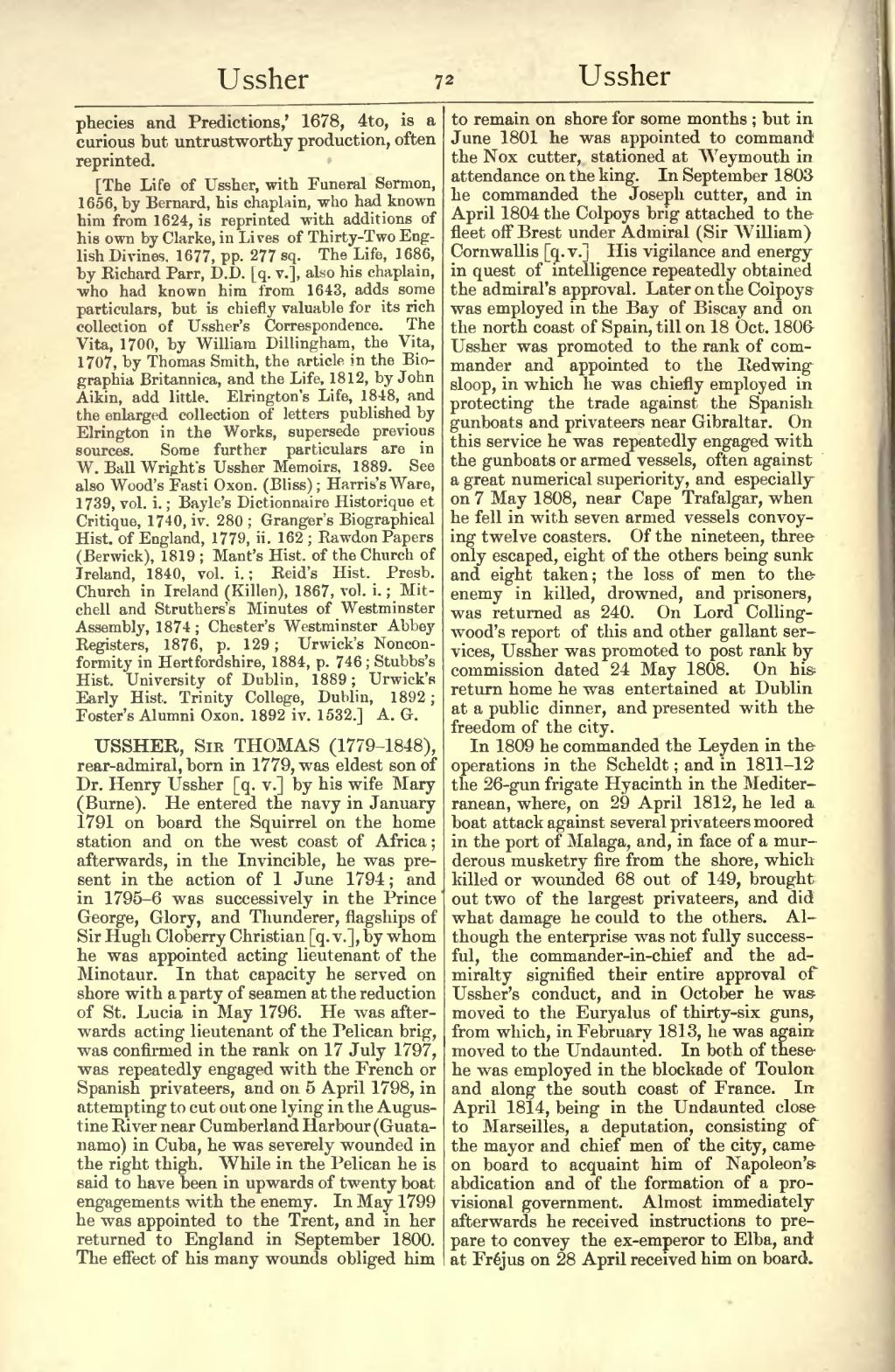phecies and Predictions,’ 1678, 4to, is a curious but untrustworthy production, often reprinted.
[The Life of Ussher, with Funeral Sermon, 1656, by Bernard, his chaplain, who had known him from 1624, is reprinted with additions of his own by Clarke, in Lives of Thirty-Two English Divines, 1677, pp. 277 sq. The Life, 1686, by Richard Parr, D.D. [q. v.], also his chaplain, who had known him from 1643, adds some particulars, but is chiefly valuable for its rich collection of Ussher's Correspondence. The Vita, 1700, by William Dillingham, the Vita, 1707, by Thomas Smith, the article in the Biographia Britannica, and the Life, 1812, by John Aikin, add little. Elrington's Life, 1848, and the enlarged collection of letters published by Elrington in the Works, supersede previous sources. Some further particulars are in W. Ball Wright's Ussher Memoirs, 1889. See also Wood's Fasti Oxon. (Bliss); Harris's Ware, 1739, vol. i.; Bayle's Dictionnaire Historique et Critique, 1740, iv. 280; Granger's Biographical Hist. of England, 1779, ii. 162; Rawdon Papers (Berwick), 1819; Mant's Hist. of the Church of Ireland, 1840, vol. i.; Reid's Hist. Presb. Church in Ireland (Killen), 1867, vol. i.; Mitchell and Struthers's Minutes of Westminster Assembly, 1874; Chester's Westminster Abbey Registers, 1876, p. 129; Urwick's Nonconformity in Hertfordshire, 1884, p. 746; Stubbs's Hist. University of Dublin, 1889; Urwick's Early Hist. Trinity College, Dublin, 1892; Notes and Queries, 9th ser. iv. 3.]
USSHER, Sir THOMAS (1779–1848), rear-admiral, born in 1779, was eldest son of Dr. Henry Ussher [q. v.] by his wife Mary (Burne). He entered the navy in January 1791 on board the Squirrel on the home station and on the west coast of Africa; afterwards, in the Invincible, he was present in the action of 1 June 1794; and in 1795–6 was successively in the Prince George, Glory, and Thunderer, flagships of Sir Hugh Cloberry Christian [q. v.], by whom he was appointed acting lieutenant of the Minotaur. In that capacity he served on shore with a party of seamen at the reduction of St. Lucia in May 1796. He was afterwards acting lieutenant of the Pelican brig, was confirmed in the rank on 17 July 1797, was repeatedly engaged with the French or Spanish privateers, and on 5 April 1798, in attempting to cut out one lying in the Augustine River near Cumberland Harbour (Guatanamo) in Cuba, he was severely wounded in the right thigh. While in the Pelican he is said to have been in upwards of twenty boat engagements with the enemy. In May 1799 he was appointed to the Trent, and in her returned to England in September 1800. The effect of his many wounds obliged him to remain on shore for some months; but in June 1801 he was appointed to command the Nox cutter, stationed at Weymouth in attendance on the king. In September 1803 he commanded the Joseph cutter, and in April 1804 the Colpoys brig attached to the fleet off Brest under Admiral (Sir William) Cornwallis [q. v.] His vigilance and energy in quest of intelligence repeatedly obtained the admiral's approval. Later on the Colpoys was employed in the Bay of Biscay and on the north coast of Spain, till on 18 Oct. 1806 Ussher was promoted to the rank of commander and appointed to the Redwing sloop, in which he was chiefly employed in protecting the trade against the Spanish gunboats and privateers near Gibraltar. On this service he was repeatedly engaged with the gunboats or armed vessels, often against a great numerical superiority, and especially on 7 May 1808, near Cape Trafalgar, when he fell in with seven armed vessels convoying twelve coasters. Of the nineteen, three only escaped, eight of the others being sunk and eight taken; the loss of men to the enemy in killed, drowned, and prisoners, was returned as 240. On Lord Collingwood's report of this and other gallant services, Ussher was promoted to post rank by commission dated 24 May 1808. On his return home he was entertained at Dublin at a public dinner, and presented with the freedom of the city.
In 1809 he commanded the Leyden in the operations in the Scheldt; and in 1811–12 the 26-gun frigate Hyacinth in the Mediterranean, where, on 29 April 1812, he led a boat attack against several privateers moored in the port of Malaga, and, in face of a murderous musketry fire from the shore, which killed or wounded 68 out of 149, brought out two of the largest privateers, and did what damage he could to the others. Although the enterprise was not fully successful, the commander-in-chief and the admiralty signified their entire approval of Ussher's conduct, and in October he was moved to the Euryalus of thirty-six guns, from which, in February 1813, he was again moved to the Undaunted. In both of these he was employed in the blockade of Toulon and along the south coast of France. In April 1814, being in the Undaunted close to Marseilles, a deputation, consisting of the mayor and chief men of the city, came on board to acquaint him of Napoleon's abdication and of the formation of a provisional government. Almost immediately afterwards he received instructions to prepare to convey the ex-emperor to Elba, and at Fréjus on 28 April received him on board.
